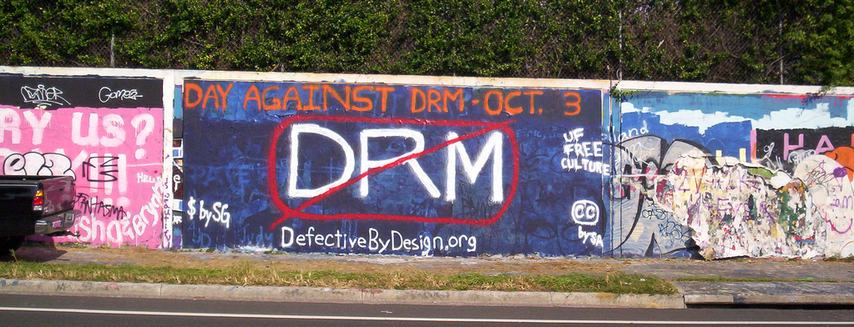The Defective by Design (DbD) campaign is a project of the Free Software Foundation (FSF). In an effort to expand our work towards a world without Digital Restrictions Management (DRM), we are asking you to donate $10 to the FSF.

We know how much you care about creating a world without DRM. Our goal at Defective by Design is to help you find ways to use your voice against the proliferation of DRM that threatens us every day.
This past year has been marked by modest successes, as well as several major disappointments from companies and regulatory institutions wanting to lock away our rights with DRM. Success came from using our voices -- together -- to fight back. We're excited to celebrate these wins and continue our work in 2018.
Victories for Team DbD
We are inspired by everything you do -- what drives us is seeing our supporters in action. When you write to us about your experiences, sign petitions, send letters, make calls, flyer at local events, take action, and make DRM-free media and tools, we see the energy necessary to take a stand against DRM and those who push it into our physical and digital homes and lives.
International Day Against DRM (IDAD) was -- again -- great this year. More than 24 organizations participated, including vendors offering discounts, communities organizing activities, and organizations and individuals around the world sharing stories about why they know DRM is wrong.
For IDAD, we asked you to tell Netflix to drop DRM from their original productions. You delivered, and we sent the letters you signed out to various executives and the board of Netflix.
We supported every new proposed exemption to the Digital Millenium Copyright Act (DMCA). The DMCA has anti-circumvention provisions, which make it illegal to circumvent DRM on your devices. However, there is a process to apply for exemptions, and we are on it. Last year, all exemptions were renewed, and many of you signed the comments we submitted for this year as well.
Juicero might seem like just another anecdote about the pointlessness of DRM, but it was a win. Media and individual response brought to light just how ridiculous the kitchen appliance was, and how DRM was making difficult even basic, necessary activities like eating. In light of a public shaming, the startup ceased development and shut down sales. This communicated clearly to investors and future entrepreneurs that DRM doesn't belong.
The W3C sold us out
After a long debate and unfair vote among members of the World Wide Web Consortium (W3C), Encrypted Media Extensions (EME) became an official Web recommendation.
EME is little more than another form of DRM made specifically for the Web. Masquerading as beneficial by calling itself encrypted, EME locks files down. This is not the same encryption that protects your communications, instead it gives companies like Amazon, Comcast, and Netflix control of your devices.
You joined us in rallying against EME. Activists, free software supporters, and Internet citizens around the world told Tim Berners-Lee, the W3C, and the Web at large about the dangers of DRM, demanding a free Web. Thanks to you, the process for EME was long, strenuous, and difficult. Rather than quietly passing a heinous policy, the W3C had to show the world its true colors. Our voices were heard, even though our warnings were not heeded.
Much like EME itself, the vote to make it a W3C Recommendation was a sham. Decisions made by the membership of the W3C are supposed to be done by consensus, implying that members must agree. However, proponents of the recommendation took advantage of the W3C's loose definition of consensus and pushed it through despite overwhelming dissent from both members and the public.
On July 6th, Tim Berners-Lee approved the proposal to enshrine EME into Web standards. We are saddened by the necessity of adding the W3C to the DbD Worst Offenders list.
What's next?
We are looking forward to seeing what we can do in 2018. Even though EME is a Web standard, we have not reached the end of this particular fight. While they may have justified their actions to themselves, they know their decisions had nothing to do with what Web citizens wanted. We were impossible to ignore, and we're going to keep it up.
Over the next year, we want to focus more on the ways DRM extends beyond media: we want to talk about hardware, medical devices, "smart home" tools, software, vehicles, and all the data these things generate that should belong to you. DRM is the epitome of technology that apologizes and says "I can't do that." This is not the technology we can allow in our lives.
We want to plan more actions and meet more of you at your events, on your campuses, in your town, and, hopefully, in ours as well. We want to write, educate, activate, and keep working towards that DRM-free world we know is possible.
I'm excited to see what we'll be doing together in 2018. Thank you!
Photo by Gavin Baker. CC-BY-SA